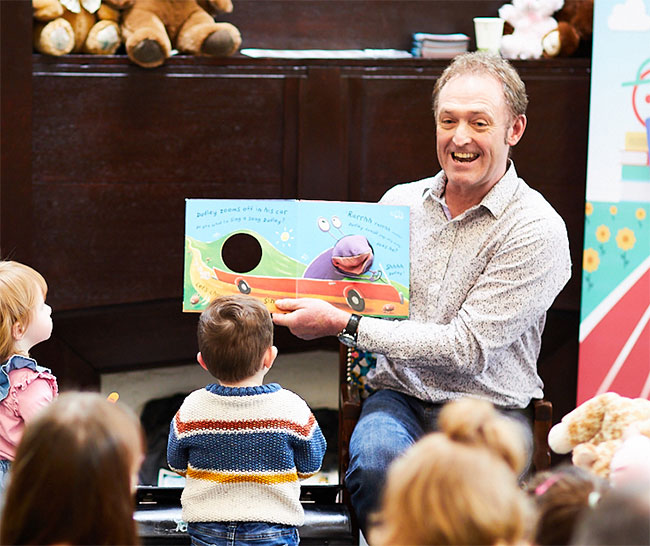Reception Reading Stars is a reading activity to help foster a love of books and reading targeted at parents/carers of children about to enter reception class in September.
Aims
- Increase the number of children starting school who are library members.
- Provide an activity for parents and children to enjoy together ensuring children are familiar with books and reading before they start school.
- Provide an activity that all children, regardless of previous setting, will have experienced before starting a school.
- Provide teachers with the opportunity to plan some work around books that will be familiar to all children starting in Reception
- Provide an opportunity for children starting school to meet each other socially through the Reception Reading Stars Social.
The challenge
In Leeds we face particular challenges around early reading experiences, with a significant gap to the national average in the percentage of children achieving the expected standard in reading at KS1. This project aims to support other projects and initiatives that are in place to ensure as a city we close this gap.
The solution
Reception Reading Stars is a simple and effective intervention.
Library staff attend and share information about Reception Reading Stars at the school’s meeting for new parents. Families receive:
- a booklet with information about the project which includes a booklist and top tips for reading together. The booklist includes books which celebrate diversity as well as a classic story, a traditional fairy tale, stories in rhyme, non-fiction and a counting book.
- an invitation to join the library and to attend some special story times over the summer holidays. The story times are themed around titles on the booklist.
A collection of the books on the booklist is available to read in libraries over the summer and additional copies of the books also available for loan.
Families are encouraged to spend time together reading all books from the booklist. After each book is read, they will receive a star from the library to add to their booklet. After they have collected all their stars the children receive a certificate to take into school in September.
Schools are encouraged to have copies of the books on display in the classroom when children start school in September, and it is also suggested that teachers prepare activity based on the books, providing some familiarity for children and boosting their confidence.
A celebration Reception Reading Stars event is held in Central Library during October half term to which all participating children from schools across the city and their families are invited. It is a splendid celebration event of books and reading.
The impact
We gave out over 500 booklets and over 200 children attended sessions across 10 libraries during the summer holidays. We also had new families joining the service.
Feedback from participating families included comments such as:
- My son really loves the session and the activities.
- My child loved it he made his new best friend and met lots of others.
- We really valued this project and our son enjoyed all aspects of it. We already read together everyday but the reading stars scheme ensured we visited the library frequently and our son took more time selecting books. Our conversations around reading were more varied, such as enjoying a particular author or illustrator, or what emotions the stories gave him.
- Lovely activities and stories in a relaxed environment. I was really grateful for the opportunity to meet other children (and mums!) before starting in September as we didn’t know anyone at the school. The kids have continued on to be friends at school and I’m so glad we came!
How is the new approach being sustained?
This is a low cost and sustainable project once all initial project planning is in place and resources (information booklets and books) have been designed, printed and purchased. The same resources can be used on subsequent projects.
Lessons learned
Communication issues.
- Schools - it can be challenging to establish good and regular communication with schools. This was exacerbated for our pilot by changing COVID restrictions introduced at the time.
- Families - We were reliant on schools communicating with families. We had created text messages to be shared by schools with families to keep them engaged with the project but discovered that the families were not set up on the school system until September. This impacted on attendance in some locations. In future we will ask families to sign up to a mailing list so we can contact them directly over the summer holidays.
- We ran this project alongside a Summer Reading Challenge targeted project with the same schools. We felt that this was confusing and overwhelming in some schools as well as for the teams delivering. We are planning to run the project in a more targeted way in future focusing on different schools for this and the SRC targeted interventions
Contact: [email protected]

